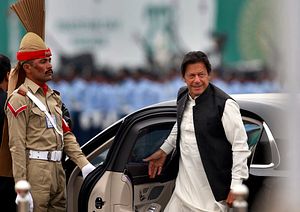On Monday, Pakistani Prime Minister Imran Khan landed himself in fresh controversy when he talked about Pakistan’s role in training jihadists during the late 1980s and sustaining contacts with them. Khan made the following remarks while speaking at a think tank in New York: “There were always links between them [security agencies and jihadist groups] — there had to be links, because they [security agencies] trained them.”
While Khan may have invited criticism over his remarks, the comments are likely to end up helping Pakistan’s case at different forums internationally.
It’s important to note that the question of the militant groups’ alleged support base in Pakistan at the state level is considered a sensitive issue, and one that every elected Pakistani government prefers to ignore. However, the recent comments are not the only occasion when Khan talked about extremist group links with the Pakistani state in the context of the Afghan jihad. In July, Khan lamented the huge human and financial cost of allying with the United States to defeat the Soviets in Afghanistan. Khan noted then that due the operations Pakistan undertook as part of its alliance with Washington, including training jihadists, had cost the country greatly.
What remains intriguing too is that even after Khan’s repeated mentions of Pakistan’s support for such groups in alliance with the United States, the current government has not faced any pressure from the security institutions in Pakistan. One of the unprecedented statements that underscores that these assertions are not just momentary expressions was his statement regarding the role of jihadists in Jammu and Kashmir. Recently, Khan in a statement said that “Anyone, who thinks that he will cross the border to join the Kashmiris (fighting for their right), is a big enemy of them and Pakistan.” A statement of such enormity that nullifies a decades-old narrative related to “Kashmir jihad” cannot be considered insignificant.
It’s probable that Khan’s statements aimed at accepting Pakistan’s previous mistakes concerning the country’s role in cultivating radical factions are a concentrated attempt to achieve an important goal. Contrary to the opinion that Khan’s statement proves that Pakistan is responsible for the region’s extremism problem, the view actually supports Islamabad’s image in a number of ways. First, following Khan’s statement on Kashmir, not a single Pakistan-based religious group whose politics focuses on floating Kashmir as a jihadist issue, raised its voice against the government. This shows that the government is actually trying to contain groups that may have been operating in Jammu and Kashmir in the past.
Second, the comments not only feed into Pakistan’s recent efforts aimed at getting rid of the stigma of having sponsored terror, but also point toward a fresh policy that rejects the existence of such groups. Moreover, Khan’s contention helps Pakistan’s position when it comes to nullifying New Delhi’s efforts to label Pakistan a state that dispatches militants to Jammu and Kashmir.
Another development also fits into this likely broader policy. Islamabad’s recent request to the the UN Security Council sanctions committee to allow Jamaat-ud Dawa (JuD) chief Hafiz Saeed access to his bank account suggests the country’s seriousness to demonstrate the world that Pakistan is committed to dealing with all forms of terrorism. Arguably, the purpose behind requesting Saeed be able to access his account is not to facilitate JuD’s financial activities. Rather, it’s to send a message that Islamabad is doing all it can to contain extremist’s financial networks, particularly India focused, as this is from where the country receives most of the pressure.
Khan’s statements indicating Pakistan’s sincerity and commitment to tackle the problem of terror are expected to help Pakistan’s case at the Financial Action Task Force (FATF). Moreover, this will also strengthen Pakistan’s support base in the United States, where many want to see Islamabad doing more to alleviate pressure from certain quarters. We “applaud PM Khan’s unambiguous & important statement that militants from Pakistan who would carry out violence in Kashmir are enemies of both Kashmiris & Pakistan,” said Alice Wells, the United States Principal Deputy Assistant Secretary for South and Central Asian Affairs.
It remains unclear whether the statements coming out from the top of the Pakistani government actually reflect a policy change or are just aimed at reversing pressure which the country faces regarding the issue of terrorism. In any case, the development is encouraging.
































